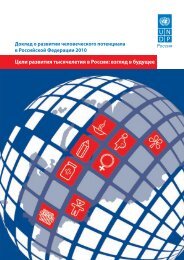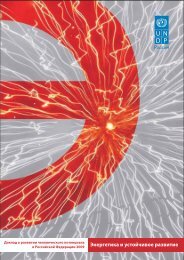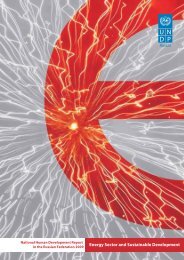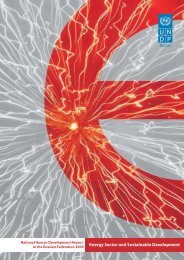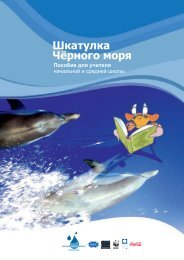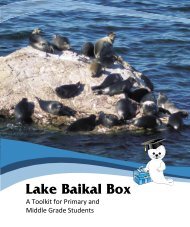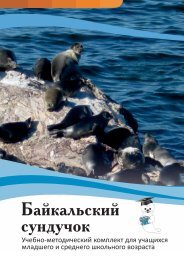sustainable development: role of the russian business - UNDP Russia
sustainable development: role of the russian business - UNDP Russia
sustainable development: role of the russian business - UNDP Russia
- No tags were found...
You also want an ePaper? Increase the reach of your titles
YUMPU automatically turns print PDFs into web optimized ePapers that Google loves.
2. Organizational Development <strong>of</strong> <strong>the</strong> UN Global CompactNetwork <strong>Russia</strong>Within this area, <strong>the</strong> UN Global Compact Network <strong>Russia</strong>participants hold, on a regular basis and in due time, organizationalevents, including meetings <strong>of</strong> <strong>the</strong> Steering Committee and GeneralMeetings, coordinate <strong>the</strong>ir activities with respect to <strong>the</strong> UN GlobalCompact principles and prepare <strong>the</strong> relevant annual newsletters,develop and maintain <strong>the</strong> webpage <strong>of</strong> <strong>the</strong> Network, develop anddistribute <strong>the</strong> quarterly newsletter.Annual meeting <strong>of</strong> <strong>the</strong> UN Global Compact Network <strong>Russia</strong> (Moscow,December 2012)Exhibition <strong>of</strong> non-financial reports <strong>of</strong> <strong>the</strong> UN Global Compact Network<strong>Russia</strong> participants (Moscow, December 2012)Award ceremony recognizing <strong>the</strong> active work <strong>of</strong> <strong>the</strong> UN Global CompactNetwork <strong>Russia</strong> participants and media (Moscow, December 2012)BUSINESS COMMUNITY OBLIGATIONSJoining <strong>the</strong> Global Compact means to declarepublicly one’s commitment to <strong>the</strong> ten universalprinciples <strong>of</strong> this initiative.Participants <strong>of</strong> <strong>the</strong> Global Compact commit<strong>the</strong>mselves to:• initiate changes to <strong>business</strong> operations sothat <strong>the</strong> Global Compact principles become anintegral part <strong>of</strong> <strong>the</strong> management and <strong>business</strong>strategy, culture, and day-to-day operations;• publish in its annual report or a similarpublic corporate report (e.g. a sustainabilityreport) a description <strong>of</strong> <strong>the</strong> ways in which <strong>the</strong>participant is supporting <strong>the</strong> Global Compactand its principles;• publicly promote <strong>the</strong> Global Compact andits principles via accessible communicationresources such as press releases, speeches, etc.;• in addition, companies are able, to <strong>the</strong> fullestextent possible, to enjoy <strong>the</strong> advantages <strong>of</strong>participation in <strong>the</strong> Global Compact through<strong>the</strong>ir involvement in <strong>the</strong> dialog with <strong>the</strong>society/stakeholders, activities <strong>of</strong> variousforums and partnerships, etc.3. Promotion <strong>of</strong> <strong>the</strong> activity results <strong>of</strong> <strong>the</strong> Network’s participantsand involvement <strong>of</strong> <strong>the</strong> <strong>Russia</strong>n <strong>business</strong> into <strong>the</strong> Global CompactinitiativeThe UN Global Compact Network <strong>Russia</strong> participants make concertedeffort to increase <strong>the</strong> awareness <strong>of</strong> <strong>the</strong>ir activity resultsthrough <strong>Russia</strong>n and foreign printed mass media, take part in publicand remarkable events in <strong>Russia</strong> and o<strong>the</strong>r countries, such as Rio+20Corporate Sustainability Forum (Rio de Janeiro, Brazil, June 2012), <strong>the</strong>European Local Networks Meeting (Rome, Italy, October 2011; Belgrade,Serbia, October 2012), <strong>the</strong> Global Corporate Social ResponsibilityConference (Seoul, Republic <strong>of</strong> Korea, November 2011), arrange<strong>the</strong>ir own events to promote international sustainability standards in<strong>Russia</strong> and engage <strong>Russia</strong>n companies in <strong>the</strong> Global Compact initiative.The Rio+20 Corporate Sustainability Forum: Innovation & Collaborationfor <strong>the</strong> Future We Want became a milestone event <strong>of</strong> 2012. At<strong>the</strong> Forum, <strong>Russia</strong>n companies and organizations actively participatedin <strong>the</strong> sessions ‘Respect for and Support <strong>of</strong> Human Rights is <strong>the</strong>Key Sustainability Principle’ and ‘Collaboration <strong>of</strong> Business with IndigenousPeoples’, presented <strong>the</strong> brochure ‘Indigenous Peoples andIndustrial Companies: Best Practices <strong>of</strong> Collaboration in <strong>the</strong> <strong>Russia</strong>nFederation’. A number <strong>of</strong> <strong>the</strong> Network’s participants presented <strong>the</strong>irbest practices relating to <strong>the</strong> implementation <strong>of</strong> <strong>the</strong> UN Global Compactprinciples in <strong>the</strong> brochure ‘The European UN Global CompactCompanies Towards Rio+20 and Beyond. A Best Practices Collection’.The effort <strong>of</strong> <strong>the</strong> <strong>business</strong> representatives that participated in events<strong>of</strong> <strong>the</strong> Forum on behalf <strong>of</strong> <strong>Russia</strong> was highly appreciated by GeorgKell, Executive Director <strong>of</strong> <strong>the</strong> UN Global Compact, who sent a letter<strong>of</strong> gratitude to <strong>the</strong> <strong>Russia</strong>n Network.On June 15–18, 2012, <strong>the</strong> Rio+20 CorporateSustainability Forum was hosted in Rio deJaneiro, Brazil. More than 2,700 global <strong>business</strong>leaders, investors, UN representatives, NGOs,academic institutions and public authoritiescame to Rio de Janeiro in order to bringgreater significance and publicity to <strong>the</strong> idea<strong>of</strong> corporate sustainability. As part <strong>of</strong> <strong>the</strong>Forum agenda, over 100 sessions devotedto 6 key topics were held: Energy & Climate,Water & Ecosystems, Agriculture & Food, SocialDevelopment, Urbanization & Cities, Economics& Finance <strong>of</strong> Sustainable Development.The final outcome <strong>of</strong> <strong>the</strong> Forum was <strong>the</strong> <strong>of</strong>ficial document ‘Overview andOutcomes: Innovation & Collaboration, Public Policy Recommendations,Commitment to Action’ presented to UN Secretary-General Ban Ki-moonon <strong>the</strong> eve <strong>of</strong> <strong>the</strong> Rio+20 UN Conference on Sustainable Development.The document contained an overview <strong>of</strong> <strong>the</strong> best corporate practices inkey <strong>sustainable</strong> <strong>development</strong> areas and a wide range <strong>of</strong> recommendationsformulated in <strong>the</strong> course <strong>of</strong> <strong>the</strong> Forum on innovation implementation,mutually beneficial cooperation and sustainability policies; <strong>the</strong> appendixto <strong>the</strong> document contained around 200 commitments assumed by leaders<strong>of</strong> corporations each <strong>of</strong> which would be reported on and tracked by <strong>the</strong>companies. The UN Global Compact Network <strong>Russia</strong> participants prepared atranslation <strong>of</strong> this document in <strong>Russia</strong>n.BENEFITS OF PARTICIPATIONThe participation <strong>of</strong> companies and organizations in <strong>the</strong> UN GlobalCompact and <strong>the</strong> UN Global Compact Network <strong>Russia</strong> <strong>of</strong>fers <strong>the</strong>following benefits:• Global Compact is an international brand;• competitive advantages in developed markets (IPO, PRI, etc.);• corporate governance improvement;• opportunities for implementing joint <strong>development</strong> projects,including international ones;• direct access to CSR technologies and <strong>the</strong> best global CSRpractices;• active and constructive dialog with <strong>the</strong> civil society and o<strong>the</strong>rstakeholders at <strong>the</strong> national and global levels, higher trust incompanies;• opportunities for engaging UN experts;• exchange <strong>of</strong> up-to-date information;• access to analytical materials in <strong>the</strong> <strong>sustainable</strong> <strong>development</strong>and CSR area.6 7



